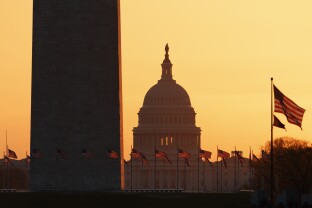The campaign arm for House Democrats has raised millions this cycle to support the party’s effort to retake the majority. But by the end of September, nearly 30% of the caucus had only paid less than half of their suggested dues to the organization, according to a spreadsheet obtained by NOTUS.
The Democratic Congressional Campaign Committee sets dues and fundraising expectations for each member of Congress based on their seniority, committee positions and how much help they’ll need during the election cycle. Frontline candidates — the 31 Democrats who are looking to hold onto seats in competitive districts — don’t have any dues. Meanwhile, Democrats in leadership and committee chairs are expected to transfer hundreds of thousands to the DCCC.
The spreadsheet shows there were 45 candidates who were less than 50% of the way to meeting their dues goals — but had paid more than $0 — with several sitting on significant amounts of cash on hand. Reps. Bill Foster, Lucy McBath and Emanuel Cleaver, for instance, all had over $1 million of cash on hand as of the end of September, per the internal document, but Foster and McBath had paid less than 20% of their required dues by then ( A spokesperson for Foster said the congressman had “fully paid on his dues for this cycle” as of the end of October. Cleaver had paid 44%. McBath isn’t considered a frontliner by the DCCC, but she’s running for reelection in a new congressional district — currently controlled by a Republican — after redistricting.)
Members who raise and dole out more money often have a competitive advantage in committee and leadership races. Rep. Raúl Grijalva, who is angling to be the top Democrat on the Natural Resources Committee once again, had only paid 5% of his dues and raised about a third of his fundraising goal. Grijalva was diagnosed with lung cancer last year, and as NOTUS reported, the numbers underscore Democratic skepticism that he’d be up to the task.
“The members who do and don’t step up on dues is particularly instructive in a cycle where we might actually take the majority and have leadership open up and potentially lots of opportunity for promotion,” a Democratic strategist and former DCCC staffer told NOTUS, adding that some members might “wish they’d played a bigger role” if they have aspirations come next session.
A DCCC spokesperson declined to comment on this story.
Of the additional 17 members who aren’t considered frontliners and haven’t paid any dues, many are retiring or seeking other offices. But others have racked up significant cash-to-dues ratios.
Rep. Josh Gottheimer’s cash-to-dues ratio is the starkest — he has more than $20 million in the bank but hasn’t made any headway on his $275,000 dues goal. His lack of payment may not be surprising, however, considering Gottheimer is eyeing a run for New Jersey governor in 2025. (Gottheimer’s spokesperson reached out after publication to say the congressman “proudly paid his dues” but did not respond to a follow up question as to when they were paid.)
Some others, like Rep. Rashida Tlaib ($4.3 million on hand per the DCCC document) and Rep. Summer Lee ($1 million on hand), have publicly fought with the Democratic Party over its approach to Israel and other issues. Alexandria Ocasio-Cortez, also a vocal critic of the party at times, also hadn’t given the DCCC any money until earlier this year, when she funneled in $260,000 to help Democrats take back the House, The New York Times reported.
None of the aforementioned members responded to a request for comment by the deadline.
Dues build trust within the party, so failing to meet goals can make climbing the ladder more difficult. But members are almost never demoted for failure to pay dues, the strategist said. The DCCC also doesn’t avoid helping members in competitive races, even if those members failed to pay dues, this person added.
“Ultimately, DCCC knows they need that seat to count to 218, so you can’t ignore a race simply because that member ignored the caucus,” the source said.
The document shows that the biggest givers to the DCCC aren’t surprising.
Minority Leader Hakeem Jeffries has been fundraising at a breakneck pace and gave the DCCC over $5 million in dues, well above his suggested $1.1 million. Members of his leadership team — including Whip Katherine Clark and Caucus Chair Pete Aguilar — have all transferred more than $1 million. Fifty-seven caucus members paid above 100% of their suggested dues.
The dues memo also suggests one of the most routine practices in Washington is alive and well: pay to play.
While it’s true no one is required to give to the DCCC to retain their position, there’s a clear expectation laid out in the document. Essentially, the top Democrats on full committees are expected to transfer at least $300,000 to the campaign arm, and subcommittee chairs are expected to transfer at least $190,000.
—
This story has been updated with comment from Gottheimer and Foster.
Shifra Dayak is a NOTUS reporter and an Allbritton Journalism Institute fellow.
Sign in
Log into your free account with your email. Don’t have one?
Check your email for a one-time code.
We sent a 4-digit code to . Enter the pin to confirm your account.
New code will be available in 1:00
Let’s try this again.
We encountered an error with the passcode sent to . Please reenter your email.


